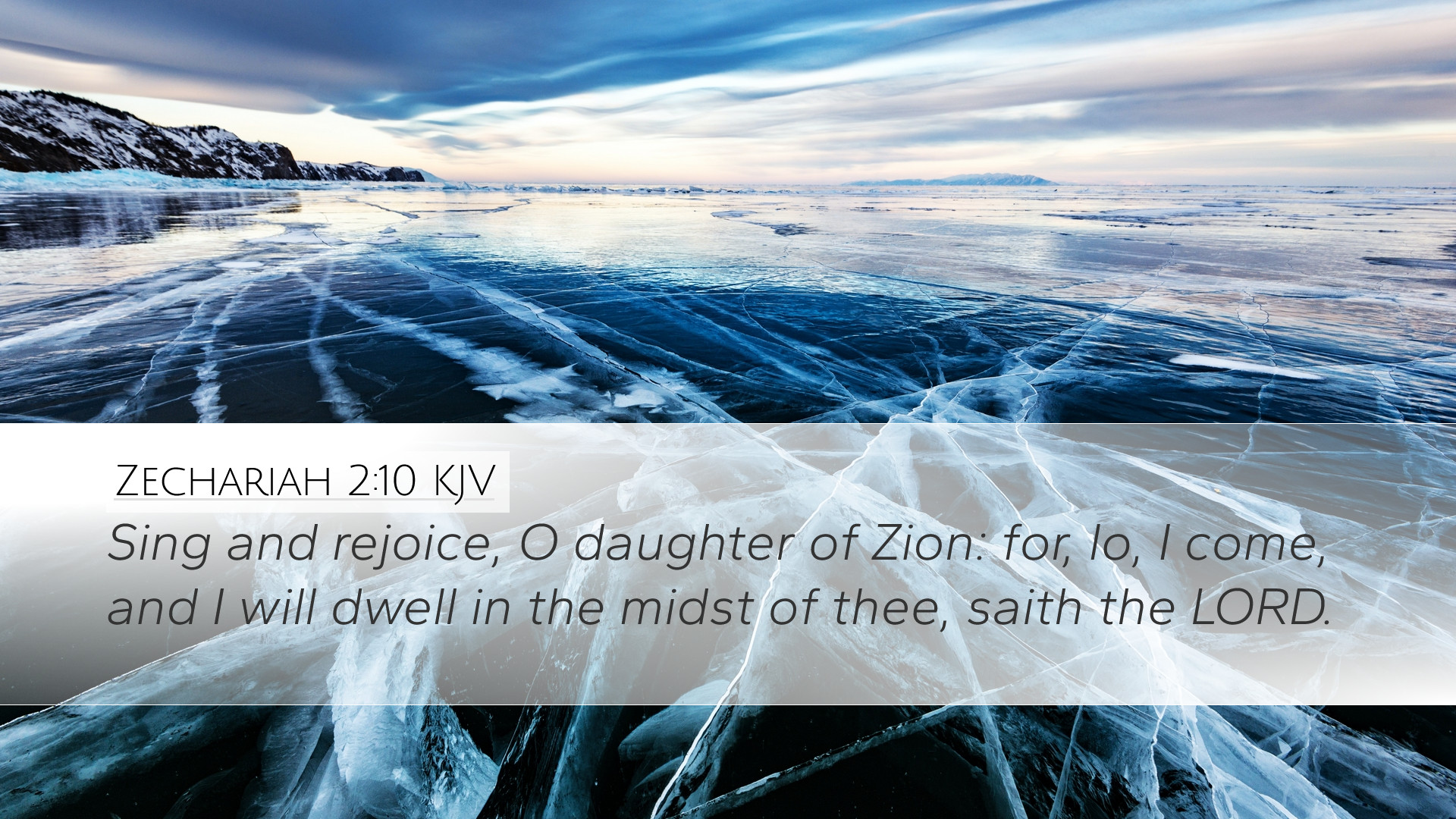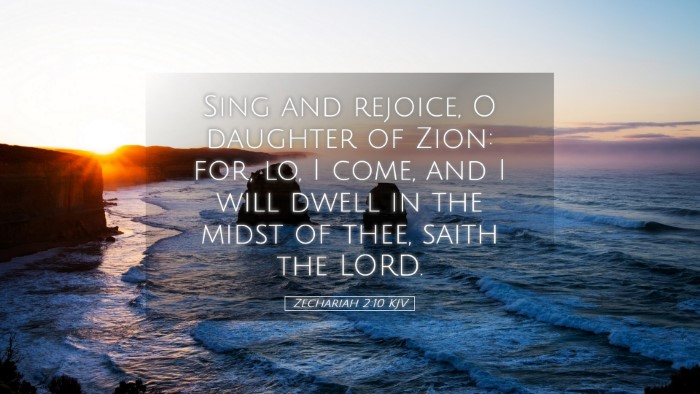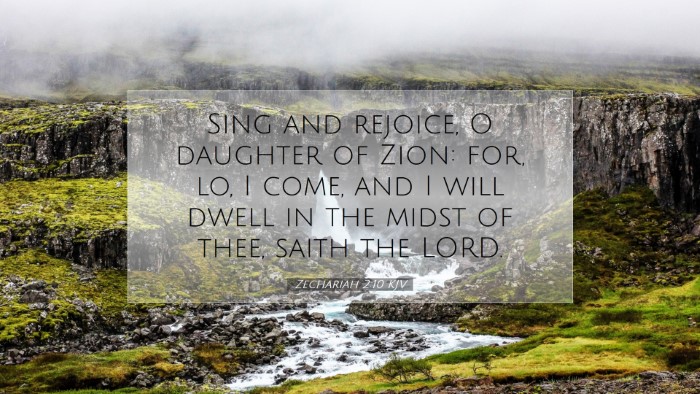Old Testament
Genesis Exodus Leviticus Numbers Deuteronomy Joshua Judges Ruth 1 Samuel 2 Samuel 1 Kings 2 Kings 1 Chronicles 2 Chronicles Ezra Nehemiah Esther Job Psalms Proverbs Ecclesiastes Song of Solomon Isaiah Jeremiah Lamentations Ezekiel Daniel Hosea Joel Amos Obadiah Jonah Micah Nahum Habakkuk Zephaniah Haggai Zechariah MalachiZechariah 2:10
Zechariah 2:10 KJV
Sing and rejoice, O daughter of Zion: for, lo, I come, and I will dwell in the midst of thee, saith the LORD.
Zechariah 2:10 Bible Commentary
Commentary on Zechariah 2:10
Verse Text: "Sing and rejoice, O daughter of Zion: for, lo, I come, and I will dwell in the midst of thee, saith the Lord."
Introduction
Zechariah 2:10 stands as a beacon of hope and divine assurance amidst the restoration of Israel. This verse encapsulates God's promise of His presence among His people, invoking a call for rejoicing and celebration. The prophet Zechariah, addressing the people upon their return from Babylonian exile, conveys a pivotal message of renewal and divine communion.
Historical Context
The book of Zechariah is set in the post-exilic period, a time when the Israelites were grappling with the reconstruction of their identity and society. As Matthew Henry notes, the exiles had returned to Jerusalem, bearing the weight of past transgressions yet yearning for restoration. This prophetic utterance highlights God’s redeeming grace amidst their struggles.
Albert Barnes emphasizes the resurgence of hope that characterized this era. The temple was being rebuilt, and the community was slowly re-establishing its worship practices. The promise of God’s presence among them served both as a comfort and a rallying point for the community’s endeavor.
Theological Insights
The verse presents a dual invitation: the call to rejoice and the assurance of divine presence. This theme of joy in the face of God's active involvement is echoed throughout scripture, reminding believers of the transformative power of God dwelling among them.
Adam Clarke points out the significance of the phrase “I will dwell in the midst of thee.” This is not merely an announcement of physical proximity but a profound affirmation of relationship. God's dwelling among His people suggests a covenantal intimacy—indicative of His promise to guide, protect, and bless His people.
Furthermore, the call to “sing and rejoice” captures the essence of worship as a response to divine grace. Matthew Henry emphasizes that true worship flows from a heart cognizant of God's mercy and presence. In this light, joy becomes an act of faith, rooted in the assurance of God's redeeming fidelity.
Interpretative Considerations
While the immediate context pertains to the physical restoration of Jerusalem, the implications of this verse extend beyond the temporal. As believers today, the promise of God’s dwelling speaks to the spiritual reality of the church. His presence is not confined to physical structures but is relational, underscoring the importance of community and fellowship among believers.
Albert Barnes suggests that the “daughter of Zion” is representative of the entire nation. This metaphorical language implies a personal relationship that God desires with each member of His people, calling them into a vibrant and communal expression of worship despite their circumstances. This perspective fosters a sense of belonging and identity, pivotal for spiritual growth and communal solidarity.
Practical Applications
- Encouragement in Trials: In times of distress, believers are reminded through this verse to celebrate God's presence. As theologians emphasize, it is integral to recognize that joy can coexist amid challenges, bolstered by the assurance of God’s nearness.
- Community and Worship: This scripture draws attention to the value of congregational worship. The invitation to “sing and rejoice” underscores how communal expressions of faith can strengthen relationships and spiral into corporate spiritual health.
- Expectation and Hope: Just as the Israelites awaited God’s action, believers today are encouraged to live in hopeful anticipation of God's promises. Engaging in faith-filled joy aligns one’s heart with God's purposes, stimulating an active faith journey.
Conclusion
Zechariah 2:10 serves as a powerful reminder of the transformative presence of God among His people. The interplay between divine promise and human response invites a profound engagement in worship and community life. In light of historical restoration, theological reflection, and practical application, this verse continues to resonate with believers, offering both hope and a call to joyful praise. As articulated by the esteemed commentators, the divine presence among us is a cause for celebration—a truth that propels the faithful into an ever-deepening relationship with God.


